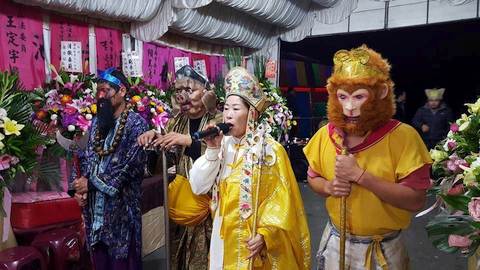Postmortem Pilgrimage: The Journey to the West as Mortuary Rite
10. Juli 2019
Postmortem Pilgrimage: The Journey to the West as Mortuary Rite
Prof. Dr. Benjamin Brose, Department of Asian Languages and Cultures, University of Michigan
10. Juli 2019, 16.15 – 17.45 Uhr

Xuanzang (600/602–664), the celebrated seventh-century Chinese cleric, pilgrim, and scholar, is arguably the most famous monk in the two-thousand year history of Chinese Buddhism. His epic seventeen-year pilgrimage from China to India, his close relationship with two Chinese emperors after his return, his subsequent translation of hundreds of volumes of Sanskrit texts into Chinese, and the influence of those translations and commentaries on Buddhist traditions throughout East Asia have taken on mythic proportions in the literature, liturgy, theater, and popular culture of China and neighboring countries. After his death, Xuanzang was apotheosized as a powerful deity in China and came to be revered as both an exorcistic spirit and as a guide for the souls of the dead.
The historical evolution of Xuanzang’s posthumous cult is closely related to the development of the famous Journey to the West (Xiyou ji), a novel published anonymously in the late sixteenth-century. While the novel and its antecedents have been studied by numerous scholars, the ritual roots of the narrative and its relationship to the deified Xuanzang are not well known.
This talk draws on recently discovered ritual manuals, liturgies, and ethnographic accounts to explore mortuary rites featuring Xuanzang and other figures from the Journey to the West story-cycle.

Benjamin Brose is associate professor of Chinese Religions and Director of Graduate Studies in the Department of Asian Languages and Cultures at the University of Michigan. His recent publications include “The Pig and the Prostitute: The Cult of Zhu Bajie in Modern Taiwan” (Journal of Chinese Religions, 2018) and Patrons and Patriarchs: Regional Rulers and Chan Monks During the Five Dynasties and Ten Kingdoms (University of Hawai’i Press, 2015).
Veranstalter: Numata Zentrum für Buddhismuskunde der Universität Hamburg
Ort: Edmund-Siemers-Allee 1, ESA-Ost, Raum 120
Der Flyer der Veranstaltung kann hier heruntergeladen werden.
Eine Audioaufnahme des Vortrages können Sie sich hier anhören.
